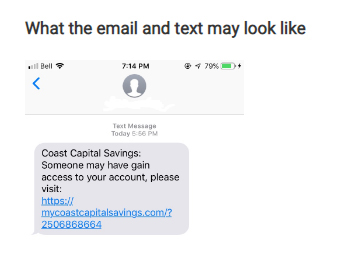Wednesday, November 28 ~ BC/National.
Coast Capital Savings got hit with an email spam event in recent days. This week they issued a Fraud Alert:
“We’re aware that some of our members have received and clicked on links in a fraudulent email and text claiming to be from Coast Capital. We would never ask you for your information through these channels,” it was advised to Coast Capital customers.
“If you get an email or text of this nature, do not click on any links or provide any information. If you’ve already done so, please visit a branch right away.”
Coast Capital Savings became approved as a federal credit union as of November 1, 2018. They were one of the earliest adopters of online banking in the late 1990s when web-banking just got rolling, being one of the first to master real-time fund transfers (without lag time between accounts).
The phishing attempt is explained as being a “Fraudulent Email and Text. Phishing scams are circulating using the name and logo of Coast Capital Savings in an email and/or text with a link to a false Coast Capital Savings website.
“These emails and texts are fraudulent and not from Coast Capital Savings. It is important to note that Coast Capital Savings would never email or text our members asking for their confidential banking or personal information. If you receive such an email or text, do not respond in any way or use the link to visit the fraudulent site.”
The messages generally have a Coast Capital Savings logo, or the logo of one of their partners such as Visa Desjardins, at the top and may come from an address such as “information@coastcapitalsavings.com”. The emails and texts ask the recipient to click on a link to verify security information. The link then connects to a website that looks very much like the actual Coast Capital Savings website.
The email and text entices the recipient to log in as they normally would by entering their account number and Personal Access Code. The recipient may then be asked to enter their Social Insurance Number/ Social Security Number, date of birth and their email address. The information is then used to commit fraud.
It is recommended to not click on the link or respond to the email in any way as it may compromise computers and smartphones.



